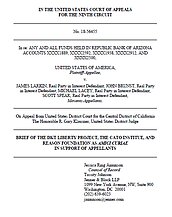Nevertheless, in recent years the federal government has pursued Backpage and its founders relentlessly, culminating in a 93-count indictment filed in 2018. Following that indictment, the government moved aggressively to seize the assets of Backpage’s founders under the theory of civil forfeiture. Civil forfeiture allows the government to seize assets on the mere suspicion that they are the proceeds of a crime or were used to facilitate criminal activity, and it is often abused. Yet, when civil forfeiture is used against publishing assets and proceeds, as it was here, there are particular First Amendment concerns. The government shouldn’t be allowed to simply assert that, say, a newspaper is publishing non-protected and illegal speech and then seize the printing presses and other assets of the paper. Allowing such actions without judicial oversight would be very dangerous to the freedom of speech.
The Supreme Court said as much in a case called Fort Wayne Books v. Indiana. In that case prosecutors brought a civil racketeering complaint against Fort Wayne Books and two other book and video stores allegedly selling obscene materials. Based on the governments unchallenged assertion, everything in the stores was seized, including books, videos, and the proceeds from the sale of books and videos. The Supreme Court overturned the seizure because there are “special rules applicable to removing First Amendment materials from circulation” and therefore the books and films could not be seized until they were first adjudged to be obscene and unprotected by the First Amendment. Mere “probable cause to believe a legal violation ha[d] transpired” was “not adequate.”
Ignoring this clear precedent, the government continues to maintain that seizing the assets from Backpage’s founders—including assets derived from publishing newspapers decades before Backpage existed—does not implicate the First Amendment. On appeal to the Ninth Circuit, Cato, joined by DKT Liberty Project and the Reason Foundation, has filed an amicus brief in support. We highlight the danger that the government’s use of civil forfeiture to seize the assets and proceeds of expressive material poses to free expression. The government has shut down a major internet site and confiscated millions of dollars of assets on nothing more than its say-so that the site and the assets and proceeds are not protected by the First Amendment. Absent any meaningful judicial check on the government here, nothing can stop it from going after other internet sites that it deems unworthy of First Amendment protection, as well as any assets held by those who own the sites. Widespread fear about sex work and sex trafficking should not be allowed to trump the First Amendment.
